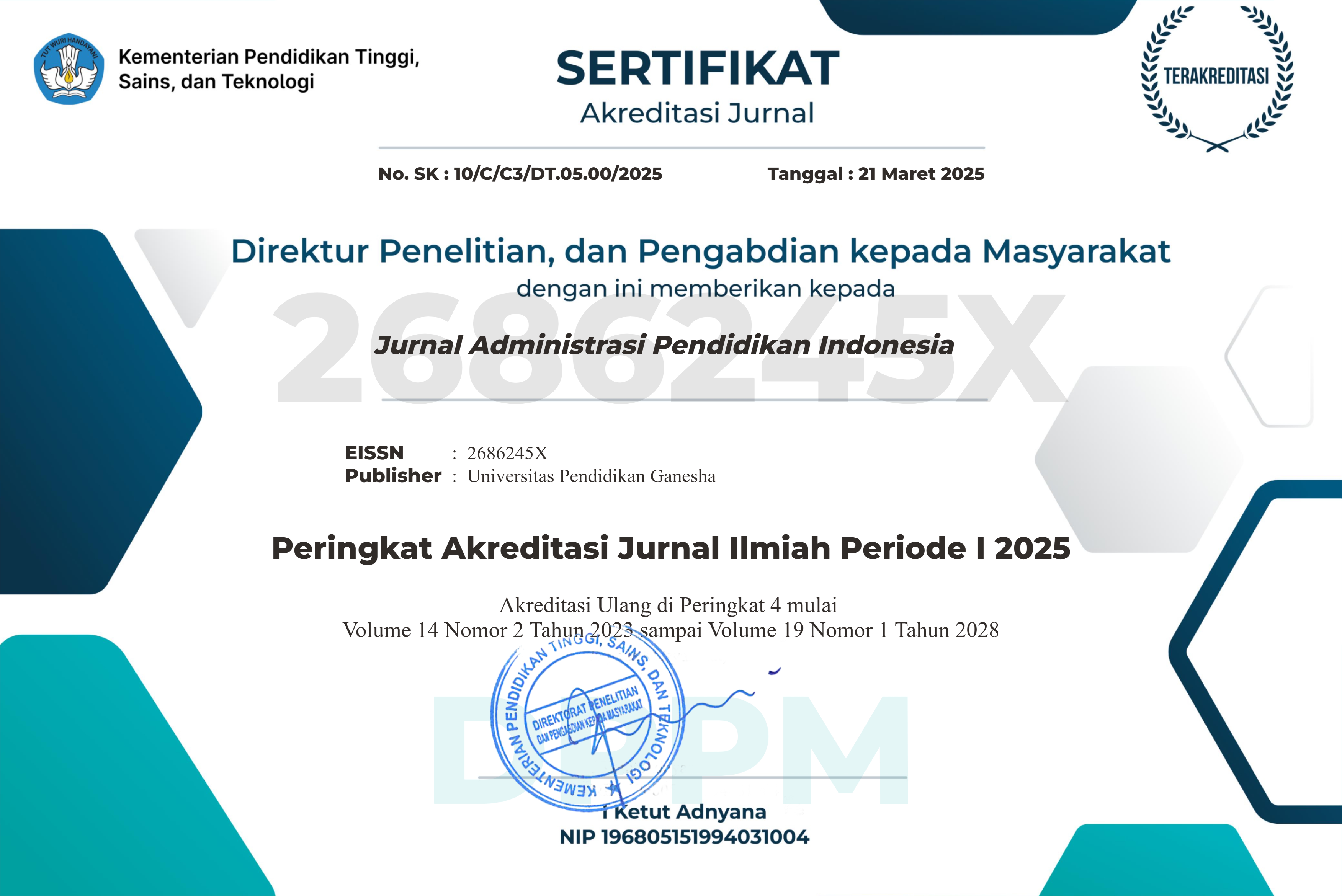Contribution of Principal Leadership Style, Work Motivation, Work Climate and Work Ethic to Teacher Performance at SMA Negeri 2 Tejakula
DOI:
https://doi.org/10.23887/jurnal_ap.v13i2.1746Keywords:
transformational leadership style, communication style, work ethic, work motivation, teacher performanceAbstract
This study aims to determine the magnitude of the relationship between principal transformational leadership style variables, communication style, work ethic, and work motivation on teacher performance at SMK Negeri 2 Tejakula. This type of research is ex post facto with multiple linear regression analysis designs. The population in this study was 50 people. The research sample of this research was 44 people. Collecting data using a questionnaire about the principal's transformational leadership style, communication style, work ethic, and work motivation on teacher performance. The collected data were analyzed using correlation analysis techniques, multiple regression, and partial correlation. The results showed that (1) there is a relationship between the principal's transformational leadership style and teacher performance at 57.7%, (2) there is a relationship between communication style and teacher performance at 71.0%, (3) there is a relationship between work ethic and teacher performance by 75.5%, (4) there is a relationship between work motivation and teacher performance by 49.7%, and (5) there is a relationship between the school principal's transformational leadership style, communication style, work ethic and work motivation which are significantly correlated with performance teachers with a correlation of 85.2%.
References
Aisha, K. (2015). Organization Commitment Of Employees In Relation To Job Involvement and Job Satifaction. IJMSS, 3(2), 12–21. https://www.frontiersin.org/articles/10.3389/f psyg.2018.00132/full
Anwar. (2017). Pengaruh Motivasi Kerja dan Kemampuan Kerja Terhadap Kinerja Pegawai (studi pada karyawan perusahaan daerah air minum PDAM Kota Malang). Jurnal Universitas Brawijaya, 12(2), 1–10. http://administrasibisnis.studentjournal.ub.ac.id/i ndex.php/jab/article/view/98
Buchari, Z. (1989). Manajemen dan Motivasi. Balai Aksara.
Dharsana, I. K., Sudarsana, G. N., Suarni, N. K., Paramartha, W. E., Tirka, I. W., & Rismawan, K. S. G. (2019). Cognitive Counseling with Reframing Techniques to Intervene in Self Aggression. Proceedings of the 5th International Conference on Education and Technology (ICET 2019), 2(3), 62–64. https://dx.doi.org/10.2991/icet-19.2019.15
Gorton, R. . (1976). School Administration Challenge and Opportunity For Leadershi. Wm. C. Brown.
Hasibuan, & S.P, M. (2016). Manajemen Sumber Daya Manusia. Bumi Aksara.
Japa. (2018). Kontribusi Perilaku Kepemimpinan Kepala Sekolah, Iklim Kerja, dan Etos Kerja terhadap Kinerja Guru Pembimbing pada SMP Negeri di Kabupaten Karangasem. E-Journal Program Pascasarjana Universitas Pendidikan Ganesha, 2(1), 24–30.
Kusnan, A. (2019). Analisis Sikap Iklim Organisasi, Etos Kerja, dan Disiplin Kerja dalam Menentukan Efektivitas Kinerja Organisasi di Garnisun Tetap III Surabaya. Universitas Airlangga Surabaya. https://repository.unair.ac.id/35933/
Lazaruth, S. (1984). Kepala Sekolah & Tanggung Jawabnya. Kanisius.
Muslihat. (2020). Kepemimpinan Kepala Sekolah dalam Kinerja Guru. Deepublish.
Panji, A., & Sri, S. (1995). Perilaku Keorganisasian. Pustaka Jaya.
Rahma, S. (2018). Kepala Sekolah dan Guru Profesional. Percetakan Universitas Islam Negeri (UIN) Ar-Raniry Darussalam.
Ratmini, N. A., Natajaya, I. N., Ketut, I. G., & Sunu, A. (2019). Komitmen Organisasi , Iklim Kerja Dan Motivasi Kerja. Jurnal Administrasi Pendidikan Indonesia, 10(2), 91–100. https://ejournal-pasca.undiksha.ac.id/index.php/jurnal_ap/article/view/2795
Undang-undang Tentang Guru dan Dosen, Pub. L. No. 14 (2005).
Ritonga, D. E., Pohan, R., Sianturi, R., Hutagalung, G. R., & Purba, G. H. (2021). Pengaruh Pengalaman Mengajar, Etos Kerja Dan Motivasi Mengajar Terhadap Kinerja Guru Smk Negeri 1 Sibolga. JEKKP (Jurnal Ekonomi, Keuangan Dan Kebijakan Publik), 2(2), 126–138. https://doi.org/10.30743/jekkp.v2i2.3388
Rowe, A. J. (2004). Creative Intelligence: Discovering the Innovative Potential in Ourselves and Others. Mizan (Terjemahan).
Sardiman, A. . (1990). Interaksi dan Motivasi Belajar Mengajar. Raja Wali Pers.
Sutrisno, E. (2016). Manajemen Sumber Daya Manusia. Kencana Prenada Media Group.
Timpe, A. D. (ed. . (1999). Seri Manajemen Sumber Daya Manusia: Kepemimpinan, Vol. 2. Gramedia Asri Media.
Wijania, I. W. (2017). Kontribusi Kepemimpinan Pelayan Kepala Sekolah, Motivasi Kerja Dan Disiplin KerjaTerhadap Kinerja Guru. Jurnal Ilmiah Pendidikan Dan Pembelajaran PPs Universitas Pendidikan Ganesha, 1(4), 176–184. https://ejournal.undiksha.ac.id/index. php/JIPP/article/view/11983
Yuliana, L. (2021). Kepemimpinan Kepala Sekolah Efektif. Rineka Cipta.











